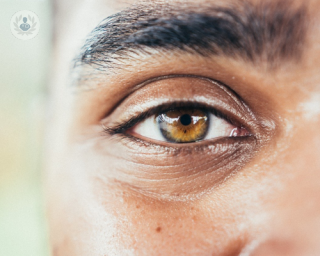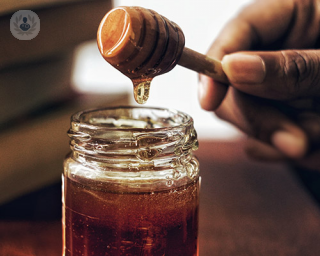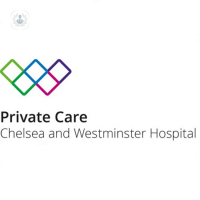What is it?
Blepharitis is an inflammatory condition of the eyelids. It can be part of a wider inflammation of the eye surface, involving the conjunctiva (the transparent membrane covering the inside of the eyelids) and the white part of the eyeball. (conjunctivitis, blepharoconjunctivitis). It can also affect the cornea (the clear window at the front of the eye) known as blepharokeratoconjunctivitis.
Blepharitis is usually a chronic condition and requires long-term management by daily lid hygiene to remove crusts and oily secretions building up at the base of the eyelashes.

What are the symptoms?
The most common symptoms of blepharitis are:
- a burning or gritty sensation
- the eyes feeling dry
In case of severe blepharitis, symptoms may also include:
- swelling of the eyelids
- pain due to frequent or irregular blinking
- photophobia (light sensitivity)
How is it diagnosed?
The hallmark of blepharitis is redness of the lid margin, with crusty/oily secretions building up at the base of the eyelashes. Your local optometrist or an ophthalmologist can provide an accurate diagnosis following examination of the eyes with a slit lamp microscope.
What causes blepharitis?
The most common causes for this condition are:
- inflammation of the Meibomian glands inside the eyelids - the oily secretions they produce to protect the tear film become too thick and the tear film becomes unstable
- blepharitis can be associated with certain skin disorders (such as rosacea and seborrhoeic dermatitis)
- allergies and environmental factors (smoking, fine dusts or particles)
- in rare cases, disorders related to the digestive tract (problems with digestion or vitamin deficiency)
How can the symptoms be reduced?
Regular eyelid hygiene (warm lid compresses followed by cleaning the lid margins) can make the eyes feel more comfortable. Tear film supplements (artificial tears) can also be helpful in reducing symptoms. Ask your chemist for preservative-free drops, because preservatives in eye drops can make the problem worse.
How is it treated?
The most important part of the treatment is daily lid hygiene. Occasionally, your ophthalmologist may prescribe a short course of strong anti-inflammatory and antibiotic eyedrops if it is important to dampen the eye surface inflammation quickly, for example when it involves the cornea. Avoiding eye oil-based make-up can help to reduce the lid margin inflammation.
05-26-2017 12-12-2024Blepharitis
Mr Scott Robbie - Ophthalmology
Created on: 05-26-2017
Updated on: 12-12-2024
Edited by: Conor Lynch
What is it?
Blepharitis is an inflammatory condition of the eyelids. It can be part of a wider inflammation of the eye surface, involving the conjunctiva (the transparent membrane covering the inside of the eyelids) and the white part of the eyeball. (conjunctivitis, blepharoconjunctivitis). It can also affect the cornea (the clear window at the front of the eye) known as blepharokeratoconjunctivitis.
Blepharitis is usually a chronic condition and requires long-term management by daily lid hygiene to remove crusts and oily secretions building up at the base of the eyelashes.

What are the symptoms?
The most common symptoms of blepharitis are:
- a burning or gritty sensation
- the eyes feeling dry
In case of severe blepharitis, symptoms may also include:
- swelling of the eyelids
- pain due to frequent or irregular blinking
- photophobia (light sensitivity)
How is it diagnosed?
The hallmark of blepharitis is redness of the lid margin, with crusty/oily secretions building up at the base of the eyelashes. Your local optometrist or an ophthalmologist can provide an accurate diagnosis following examination of the eyes with a slit lamp microscope.
What causes blepharitis?
The most common causes for this condition are:
- inflammation of the Meibomian glands inside the eyelids - the oily secretions they produce to protect the tear film become too thick and the tear film becomes unstable
- blepharitis can be associated with certain skin disorders (such as rosacea and seborrhoeic dermatitis)
- allergies and environmental factors (smoking, fine dusts or particles)
- in rare cases, disorders related to the digestive tract (problems with digestion or vitamin deficiency)
How can the symptoms be reduced?
Regular eyelid hygiene (warm lid compresses followed by cleaning the lid margins) can make the eyes feel more comfortable. Tear film supplements (artificial tears) can also be helpful in reducing symptoms. Ask your chemist for preservative-free drops, because preservatives in eye drops can make the problem worse.
How is it treated?
The most important part of the treatment is daily lid hygiene. Occasionally, your ophthalmologist may prescribe a short course of strong anti-inflammatory and antibiotic eyedrops if it is important to dampen the eye surface inflammation quickly, for example when it involves the cornea. Avoiding eye oil-based make-up can help to reduce the lid margin inflammation.


What to do if your child has blepharitis
By Dr Annegret Dahlmann-Noor
2024-12-14
Blepharitis is a common eye problem that commonly affects children, as well as adults. If your child is suffering from blepharitis they might be sensitive to light, blinking a lot or rubbing their eyes frequently. Here is some expert advice to parents from a top ophthalmologist, Dr Annegret Dahlmann-Noor. See more


What is a LipiFlow® procedure?
By Mr Myer Mark Yodaiken
2024-12-14
LipiFlow® heat therapy helps to melt the contents of the meibmomian glands in order to relieve dry eyes. Expert ophthalmologist Mr Myer Yodaiken explains this procedure in a little more detail. See more


Treating eye disease with natural remedies – could they really work?
By Professor Sunil Shah
2024-12-14
Eye diseases like blepharitis, dry eyes and keratitis are difficult to live with, and medical treatments only provide so much relief. Professor Sunil Shah, a leading ophthalmologist, investigates the possibility of natural remedies for treating such eye dieseases. See more


Why it’s important to treat blepharitis early on
By Mr Sam Orkar
2024-12-14
Do you have burning, itching, watery eyes? It might be a case of blepharitis. Here, one of our experts Mr Sam Orkar explains why it is better to treat the eye condition as early as possible and how to manage the condition at home. See more
Experts in Blepharitis
-
Mr Richard Scawn
OphthalmologyExpert in:
- Oculoplastics
- Blepharoplasty
- Ptosis (droopy eye)
- Watery eyes
- Chalazion
- Blepharitis
-
Dr Annegret Dahlmann-Noor
OphthalmologyExpert in:
- Amblyopia
- Blepharitis
- Conjunctivitis
- Myopia
- Paediatric ophthalmology
- Strabismus (squint)
-
Professor Saurabh Jain
OphthalmologyExpert in:
- Paediatric ophthalmology
- Strabismus (squint)
- Amblyopia
- Watery eyes
- Blepharitis
- Cataracts
-
Mr Myer Mark Yodaiken
OphthalmologyExpert in:
- Dry eye
- Blepharitis
- Macular degeneration (AMD)
- Glaucoma
- Meibomian gland dysfunction (MGD)
- Chalazion
-
Professor Parwez Hossain
OphthalmologyExpert in:
- Cataracts
- Pterygium and pinguecula
- Blepharitis
- Corneal cross-linking
- Corneal transplant
- Keratitis
- See all

Safarian & Simon Opticians Deactivated
Safarian & Simon Opticians Deactivated
72 St John's Wood High St, London
No existe teléfono en el centro.
By using the telephone number provided by TOP DOCTORS, you automatically agree to let us use your phone number for statistical and commercial purposes. For further information, read our Privacy Policy
Top Doctors

Tunbridge Wells Eye Centre
Tunbridge Wells Eye Centre
7 Vale Ave, Tunbridge Wells TN1 1DJ
No existe teléfono en el centro.
By using the telephone number provided by TOP DOCTORS, you automatically agree to let us use your phone number for statistical and commercial purposes. For further information, read our Privacy Policy
Top Doctors

Private Care at Chelsea and Westminster Hospital
Private Care at Chelsea and Westminster Hospital
Chelsea and Westminster Hospital, 369 Fulham Rd.
No existe teléfono en el centro.
By using the telephone number provided by TOP DOCTORS, you automatically agree to let us use your phone number for statistical and commercial purposes. For further information, read our Privacy Policy
Top Doctors
-
Safarian & Simon Opticians Deactivated
72 St John's Wood High St, London, Central LondonExpert in:
- Cataracts
- Eyelid surgery
- Complex eye conditions
- Contact lenses for dry eyes
- Dry eye
- Optometry
-
Tunbridge Wells Eye Centre
7 Vale Ave, Tunbridge Wells TN1 1DJ, Tunbridge WellsExpert in:
- Cataracts
- Oculoplastics surgery
- Laser eye surgery
- Refractive surgery
- Facial aesthetics
- Ophthalmology
-
Private Care at Chelsea and Westminster Hospital
Chelsea and Westminster Hospital, 369 Fulham Rd., Central LondonExpert in:
- General Surgery
- Dermatology
- Paediatric Dermatology
- Paediatrics
- Preventive paediatrics
- Adult and paediatric services
- See all
- Most viewed diseases, medical tests, and treatments
- Visual impairment
- Diabetic retinopathy
- Retina
- Visual stress (Meares-Irlen syndrome)
- Presbyopia
- Nystagmus
- Myopia
- Hyperopia (farsightedness)
- Eye examination
- Demodex








